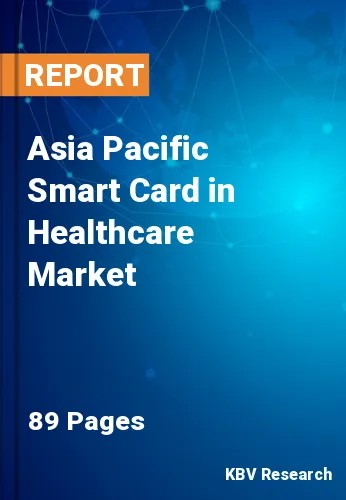The Asia Pacific Smart Card in Healthcare Market would witness market growth of 14% CAGR during the forecast period (2021-2027).
With the improved technology and medicines, the life expectancy of people is increasing. But, as the age increases, the requirement for propelling healthcare services and its frequency of getting medical attention also increases, which further surges the total expenses incurred by the patient. The scattered and over-surplus of medical records and files make it difficult to directly approach any doctor and share all these records, which makes it more difficult for medical professionals to treat patients appropriately.
The healthcare sector and its market players are under huge pressure to make affordable medical services and save more money. The cost surge is one of the crucial challenges faced by the governments, hospitals, insurance companies, pharmacies, healthcare providers, and many others. Overall costs for medical services are high for the patients as well as for the companies. Healthcare insurances absorb some part of the costs associated with broken bones, emergency care, check-ups, ongoing treatment, and hundreds of other kinds of care. This makes it important to develop a method that makes the healthcare system more streamlined and convenient.
The rising disposable income of the customers in emerging nations like India and China is among the key driving factors bolstering the growth of the regional smart card in healthcare market. In addition, there are many insurance companies that are promoting the usage of smart health cards to better facilitate and streamline the healthcare sector.
The supportive government initiatives across various nations are also contributing to the fueling growth of the regional smart card in healthcare market. In addition, the rising technological advancements in the healthcare system of this region are opening lucrative opportunities for the key market players to enter and prosper this region. Governments of many nations are putting more effort in making a strong healthcare system along with promoting the usage of advanced technologies among the customers would propel the growth of the regional market in the coming years.
The Contactless Smart Cards market dominated the South Korea Smart Card in Healthcare Market by Product in 2020, thereby, achieving a market value of $23.8 million by 2027. The Contact-based Smart Cards market is estimated to grow at a CAGR of 14% during (2021 - 2027). Additionally, The Hybrid Smart Cards market is showcasing highest CAGR of 15.6% during (2021 - 2027).
Based on Product, the market is segmented into Contactless Smart Cards, Contact-based Smart Cards, Hybrid Smart Cards and Dual-interface Smart Cards. Based on Component, the market is segmented into Microcontroller Based Smart Cards and Memory-card Based Smart Cards. Based on countries, the market is segmented into China, Japan, India, South Korea, Singapore, Malaysia, and Rest of Asia Pacific.
Free Valuable Insights: The Worldwide Smart Card in Healthcare Market is Projected to reach USD 2.3 Billion by 2027, at a CAGR of 13%
The market research report covers the analysis of key stake holders of the market. Key companies profiled in the report include Infineon Technologies AG, Texas Instruments, Inc., NXP Semiconductors N.V., Thales Group S.A., Atos Group, Giesecke & Devrient GmbH, American Express Company, VeriFone Holdings, Inc. (Francisco Partners), IDEMIA SAS (Advent International, Inc.) and CardLogix Corporation.
By Product
By Component
By Country
Our team of dedicated experts can provide you with attractive expansion opportunities for your business.

